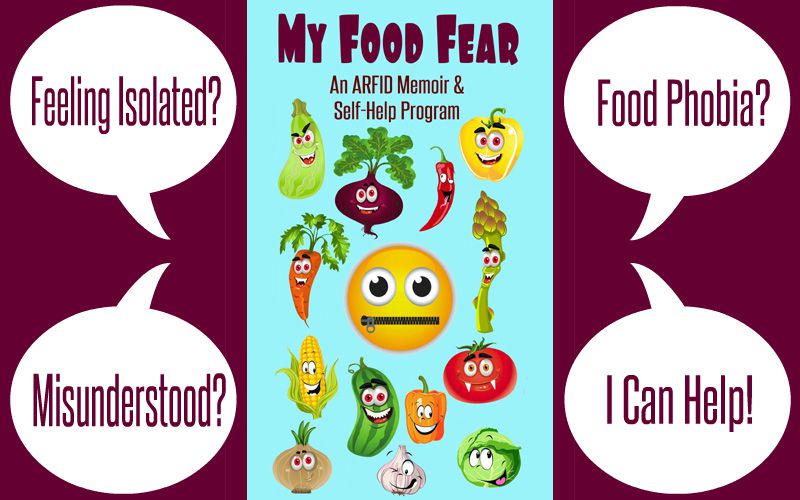Avoidant restrictive food intake disorder (ARFID) is an eating disorder that is actually rather common, especially among young male children. Layman terms for the disorder include food fear, food phobia, picky eating and selective eating. The name of the condition was revised in 2013 in the Diagnostic and Statistical Manual of Mental Disorders (DSM) to replace the former diagnosis called Selective Eating Disorder (SED).
These facts aside, ARFID is a condition that I suffered from for many years, although I had absolutely no idea that there was an actual diagnosis for my problem until after I overcame it! It wasn’t until I was fully recovered from the disorder that I even learned how widespread it truly is and how many people are desperate for help in broadening their eating habits.
My goal in this post is to discuss some of the important facts of avoidant restrictive food intake disorder, but unlike most medical sources, to also humanize the condition and let people who suffer from food phobia know that they are not alone. There are many of us suffering in the world and the majority will never recover, since help is not generally available or even sought after in most circumstances.
I was fortunate in that a cure found me… I never sought to change my eating behavior, despite my desire to do so. I just accepted that I was how I was and got on with life. However, life surprised me and provided the cure I needed to eat normally and rejoin society with no phobias or restrictions on my diet.
ARFID IS an Eating Disorder
When I was young and suffering from ARFID, I just assumed that I was weird. I knew my eating was not normal from a very early age, but I was powerless to change it. My mother brought me to 2 different doctors and neither proposed that I had any diagnosable condition, such as ARFID or SED. The first doctor told my mother to beat my knuckles with a wooden spoon until I ate. The second told her to put me on a vegetarian Indian diet. I wanted no part of either of these 2 “solutions” and both were ignored by my mom, who simply gave up and left me alone from then on…
I do not know if being positively diagnosed with an eating disorder would have helped me or not. I did suffer with ARFID from at least the age of 2 to the age of about 37. My recovery was slow, but eventually I did manage to end the disorder and its hold over my life. I provide additional details in My ARFID Story and tell my complete, uncensored story in my acclaimed ARFID book: My Food Fear.
There is a common complaint in today’s healthcare system that EVERYTHING has a diagnosis. As a chronic pain specialist, patient educator and patient rights advocate for decades, I agree that the diagnosis of so-called “aberrant health issues” is a bit out of control, especially in the psychological field of wellness. However, I am happy to see that ARFID is an actual condition that can now be positively diagnosed and treated successfully in most people. It gives me hope that many more people might find relief sooner than I did and certainly far sooner than they expect… Statistics clearly show that most people who suffer from severe avoidant restrictive food intake disorder expect to live their entire lives with the condition. I know for sure that I did!

Avoidant Restrictive Food Intake Disorder Consequences
AFRID is not inherently pathological. However, it certainly can and usually does cause negative physical, psychoemotional and social effects on its victims. This makes the disorder very serious, since it will have far-reaching effects of health, life and personal development. I know that my development was certainly negatively influenced by ARFID, despite being miraculously healthy the entire time I suffered with my extreme case of selective eating disorder.
There are potentially negative physical health conditions that are often resulting from ARFID, including malnutrition, abnormally low weight, abnormally low muscle mass, chronic fatigue and a variety of general and specific health issues linked to nutritional deficiencies. These are not always observed clinically. In my case, I ate almost nothing when it came to variety, but I was healthy my entire life. I have met others who were not as fortunate as I in this regard.
However, the more important consequences of ARFID are the social and psychological impacts of the condition. Virtually all sufferers view themselves as being different, isolated and possibly even damaged due to their disorder. Many lack social eating skills and suffer horrible anxiety when faced with dining socially. Family gatherings, restaurant dining and other social events become traumatic, instead of joyful. I know I felt this way for decades!
Can Avoidant Restrictive Food Intake Disorder Be Cured?
Cure is a strange word to use here, but it is not incorrect. The condition is certainly a disorder and it can be resolved completely. Therefore, “cure” is strangely appropriate, even though the disorder is not a disease! I certainly consider myself to have found a cure for my own eating disorder.
It is simply amazing that I never set out to cure my ARFID and all the people who tried to help me failed miserably, including those closest to me. I am thankful that the vast majority of people in my life did NOT make me feel bad about myself for having avoidant restrictive food intake disorder. I already felt bad enough about myself, especially as I got older…
My cure came in a strange form. It was a person who managed to somehow get me to open up to food extremely slowly over time. Her patience and gentle manner worked like a ninja to sneak different foods into my diet. Over months, then years, I learned that food was indeed good. I overcame my baseless fears and eventually got to the stage of being a very open and even experimental eater. Since now I am a world traveler, this evolution has served me well and has definitely increased my satisfaction with life.
I will discuss various forms of treatment for avoidant restrictive food intake disorder in dedicated posts on the topic. I encourage all people who suffer self-imposed eating prohibitions to get help, if they desire to do so. Life will be much better when you can eat “normally”. You do not need to suffer with fear, anxiety and the potential for truly serious health consequences as a result of your picky eating.
I am here to help you and hope that you will accept that a cure is indeed possible, even though you probably feel it is highly unlikely given your current eating habits. If I can change; you can! My diet was about as restrictive as it could be and barely adequate to keep me alive…

Leave a Reply
You must be logged in to post a comment.